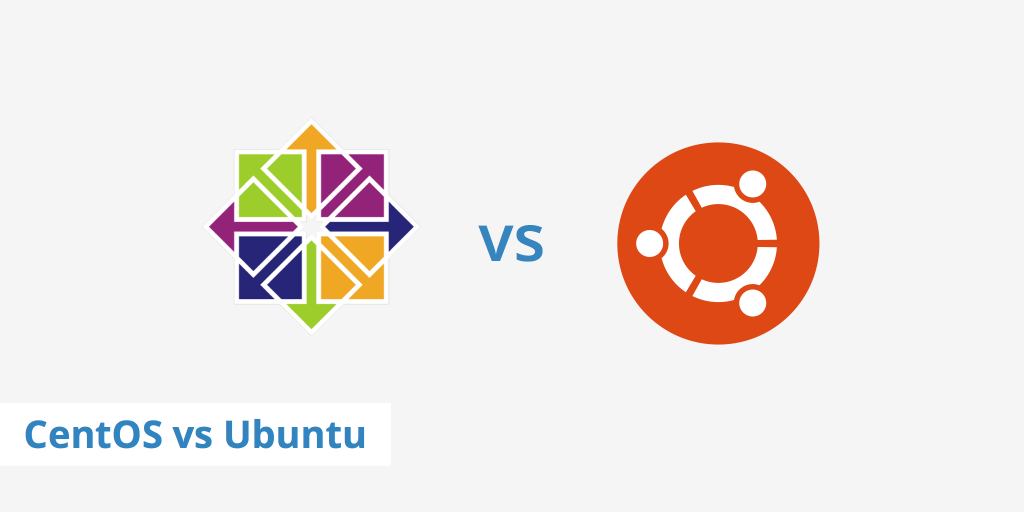Choosing the right operating system for your server is a critical decision, as it can significantly impact performance, security, and ease of management. Among the many options available, CentOS and Ubuntu are two of the most popular choices for server environments. In this blog post, we’ll compare CentOS and Ubuntu across various factors to help you determine which one suits your needs best.

Table of Contents
What is CentOS
CentOS, an acronym for Community Enterprise Operating System, stands as an open-source Linux distribution meticulously patterned after Red Hat Enterprise Linux (RHEL), a renowned choice within the corporate IT landscape. Emerging in 2004, CentOS functions as a top-tier operating system for enterprises, supported by an engaged community, enabling users to harness its potent capabilities at no cost.

Its close alignment with RHEL grants CentOS manifold advantages, encompassing extensive customizability, fortified security measures, and exceptional resilience, rendering it an appealing option for businesses and developers alike. Furthermore, CentOS inherits RHEL’s thorough testing and enterprise-caliber software, ensuring its suitability for critical applications and environments.
Nevertheless, it’s pivotal to acknowledge that CentOS Linux 8 concluded its lifecycle on December 31, 2021, while CentOS Linux 7 is slated to conclude on June 30, 2024. In response, the CentOS community introduced CentOS Stream, a progressive-release Linux distribution serving as an upstream development platform for RHEL. By embracing CentOS Stream, users gain access to expedited updates, enabling them to stay abreast of the latest enhancements and features while upholding compatibility with RHEL.
What is Ubuntu
Ubuntu, a versatile and widely embraced open-source Linux distribution rooted in the Debian architecture, has garnered substantial acclaim since its inception in 2004. Its appeal spans individual users, developers, and businesses alike, owing to its intuitive interface, rich feature set, and robust performance.

Central to Ubuntu’s allure is its expansive repository of package groups and functionalities, empowering users to tailor the system precisely to their requirements. The Ubuntu Software Center provides a wealth of applications, simplifying the process of discovering and installing new software packages. Encompassing diverse categories such as productivity, multimedia, education, and gaming, this extensive selection caters to a wide spectrum of user needs.
In addition to its adaptability, Ubuntu boasts formidable security features. Regular updates, inclusive of security patches, fortify the system against emerging threats. Moreover, Ubuntu integrates built-in security mechanisms like AppArmor and the Uncomplicated Firewall (UFW), bolstering system defenses and upholding integrity.
Furthermore, Ubuntu distinguishes itself through its vibrant community support, fostering collaboration in issue resolution, knowledge sharing, and feature development. This robust support network eases navigation of the Ubuntu ecosystem, particularly for newcomers, facilitating learning and engagement.
CENTOS and UBUNTU – COMPARISON OVER DIFFERENT ASPECTS
Comparing CentOS and Ubuntu involves evaluating various aspects to determine which operating system best suits your needs. Below, I’ll provide a comprehensive comparison across different dimensions

Performance
Both CentOS and Ubuntu offer excellent performance, but the choice may depend on your specific requirements. CentOS, being based on RHEL, is often preferred for enterprise environments where stability is paramount. It undergoes rigorous testing and is renowned for its reliability. On the other hand, Ubuntu tends to offer more bleeding-edge features and updates, which may appeal to users seeking the latest advancements.
Package Management
Package management is a crucial aspect of server administration, and both CentOS and Ubuntu have robust package managers. CentOS employs YUM (Yellowdog Updater, Modified), while Ubuntu uses APT (Advanced Package Tool). Both package managers are efficient and user-friendly, offering extensive repositories with a wide range of software packages.
Community and Support
Ubuntu boasts a large and active community, making it easy to find support through forums, documentation, and online resources. Additionally, Canonical, the company behind Ubuntu, offers commercial support options for businesses requiring extra assistance.
CentOS also benefits from a sizable user community, particularly in enterprise environments. However, since CentOS is a downstream rebuild of RHEL, support may primarily come from Red Hat or paid support options.
Security
Both CentOS and Ubuntu prioritize security and regularly release updates to address vulnerabilities. However, Ubuntu’s release cycle tends to be more frequent, meaning security patches may be available sooner compared to CentOS. Additionally, Ubuntu’s emphasis on usability often includes security features enabled by default, such as the Uncomplicated Firewall (UFW).
Compatibility and Ecosystem
When it comes to compatibility and ecosystem, CentOS has long been favored in enterprise environments due to its compatibility with RHEL. Many software vendors certify their applications to run on CentOS, providing assurance for businesses seeking compatibility.
Ubuntu, while not as deeply entrenched in the enterprise sphere, has gained popularity for its compatibility with cloud platforms such as AWS, Azure, and Google Cloud. Its focus on desktop usability has also contributed to its widespread adoption in various environments.
Conclusion
Ultimately, the choice between CentOS and Ubuntu for your server depends on your specific needs and preferences. If stability and long-term support are paramount, CentOS may be the ideal choice, especially for enterprise environments. On the other hand, if you value ease of use, frequent updates, and a vibrant community, Ubuntu might be the better option.
Consider factors such as performance requirements, package management preferences, security needs, and compatibility with existing infrastructure when making your decision. Regardless of your choice, both CentOS and Ubuntu are solid options for powering your server infrastructure.
Remember to thoroughly evaluate your options and consider testing both operating systems in your environment before making a final decision. Ultimately, the right choice is the one that best aligns with your organization’s goals and requirements.



